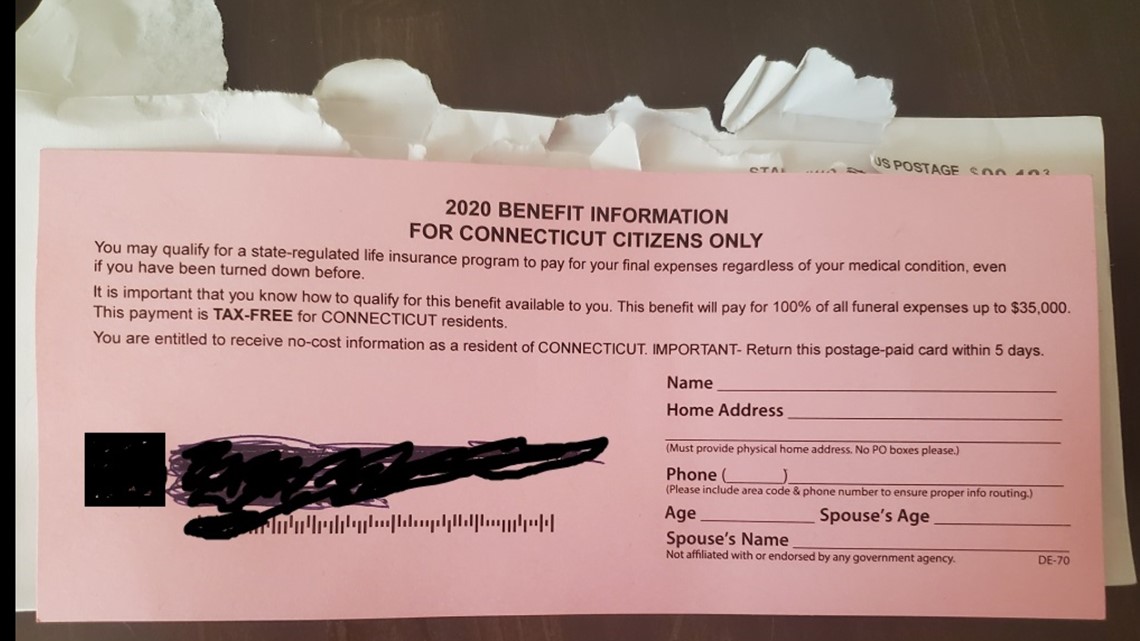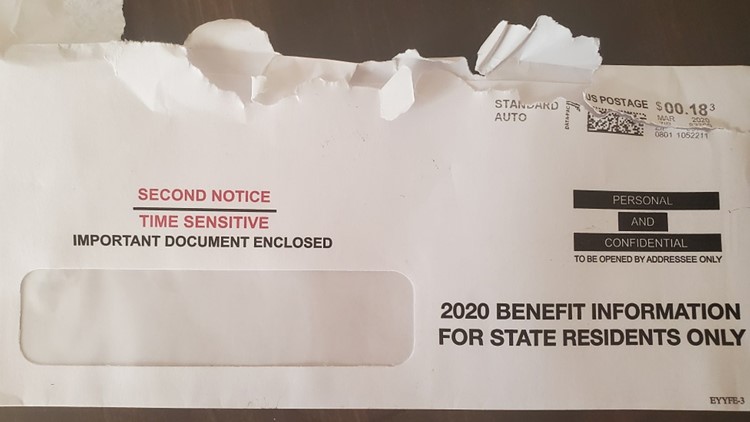BRISTOL, Conn. — When Ashley Nedley picked up her mail Wednesday she noticed something right away.
"I received a letter in the mail addressed to my home with my name on it. When I read the envelope it made me nervous making me open it immediately. Says 2020 BENEFIT INFORMATION FOR STATE RESIDENTS ONLY. SECOND NOTICE, TIME SENSITIVE on the envelope. Inside I found a pink paper with a paid return envelope," said Ashley in an email to FOX61.
She did exactly what she should have done, be suspicious.
What she found inside requested information for a life insurance policy that would pay funeral expenses. She hadn't requested any information and the form was very vague and listed no organization name except a company in Iowa. In small letters it said there was no connection to any government agency.


While they did not request any sensitive information, it played upon fears with the current COVID-19 pandemic.
The Internal Revenue Service urged taxpayers to be on the lookout for a surge of calls and email phishing attempts about the Coronavirus, or COVID-19. These contacts can lead to tax-related fraud and identity theft.
"We urge people to take extra care during this period. The IRS isn't going to call you asking to verify or provide your financial information so you can get an economic impact payment or your refund faster," said IRS Commissioner Chuck Rettig. "That also applies to surprise emails that appear to be coming from the IRS. Remember, don't open them or click on attachments or links. Go to IRS.gov for the most up-to-date information."
While the form Ashley got did not make a link to the IRS, it's always good to be cautious, especially when the sender is urging immediate action.
"Everyone [is] on edge and [I'm] afraid this letter will be read by people who may believe and give out enough personal information believing their funeral expenses may be paid," said Ashley.
You can always contact the Better Business Bureau if you have concerns.
OTHER WARNINGS FROM THE IRS
Don’t fall prey to Coronavirus tricks; retirees among potential targets
The IRS and its Criminal Investigation Division have seen a wave of new and evolving phishing schemes against taxpayers. In most cases, the IRS will deposit economic impact payments into the direct deposit account taxpayers previously provided on tax returns. Those taxpayers who have previously filed but not provided direct deposit information to the IRS will be able to provide their banking information online to a newly designed secure portal on IRS.gov in mid-April. If the IRS does not have a taxpayer’s direct deposit information, a check will be mailed to the address on file. Taxpayers should not provide their direct deposit or other banking information for others to input on their behalf into the secure portal.
The IRS also reminds retirees who don’t normally have a requirement to file a tax return that no action on their part is needed to receive their $1,200 economic impact payment. Seniors should be especially careful during this period. The IRS reminds retirees – including recipients of Forms SSA-1099 and RRB-1099 − that no one from the agency will be reaching out to them by phone, email, mail or in person asking for any kind of information to complete their economic impact payment, also sometimes referred to as rebates or stimulus payments. The IRS is sending these $1,200 payments automatically to retirees – no additional action or information is needed on their part to receive this.
The IRS reminds taxpayers that scammers may:
- Emphasize the words “Stimulus Check” or “Stimulus Payment.” The official term is economic impact payment.
- Ask the taxpayer to sign over their economic impact payment check to them.
- Ask by phone, email, text or social media for verification of personal and/or banking information saying that the information is needed to receive or speed up their economic impact payment.
- Suggest that they can get a tax refund or economic impact payment faster by working on the taxpayer’s behalf. This scam could be conducted by social media or even in person.
- Mail the taxpayer a bogus check, perhaps in an odd amount, then tell the taxpayer to call a number or verify information online in order to cash it.
Reporting Coronavirus-related or other phishing attempts
Those who receive unsolicited emails, text messages or social media attempts to gather information that appear to be from either the IRS or an organization closely linked to the IRS, such as the Electronic Federal Tax Payment System (EFTPS), should forward it to phishing@irs.gov.
Taxpayers are encouraged not to engage potential scammers online or on the phone. Learn more about reporting suspected scams by going to the Report Phishing and Online Scams page on IRS.gov.



